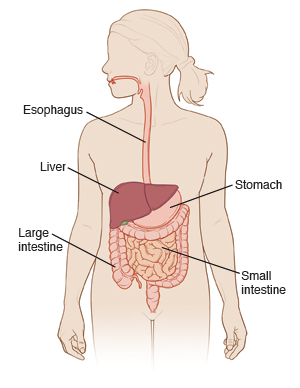Bacterial Gastroenteritis (Adult)

You have gastroenteritis. This is an infection in your intestinal tract caused by bacteria. Viruses, parasites, and toxins may also cause it. This infection may cause fever, vomiting, stomach cramping, and diarrhea. You may have blood or mucus in your stool. Some of the more common causes of bacterial gastroenteritis include E. coli, salmonella, shigella, campylobacter, and clostridioides difficile (C.diff).
Antibiotics are sometimes used to treat this type of infection. But, you may need to wait until a stool culture is done before your healthcare provider gives you an antibiotic. In the meantime, follow the advice below. Don't take antibiotics without your provider's recommendation. This can lead to other complications in certain types of bacterial gastroenteritis.
Home care
Medicines
-
If your healthcare provider prescribed antibiotics, be sure you take them until they are finished, even if you feel better.
-
You may use acetaminophen or nonsteroidal anti-inflammatory drugs (NSAID) such as ibuprofen or naproxen to control fever unless another medicine was prescribed. If you have chronic liver or kidney disease, talk with your provider before using these medicines. Also talk with your provider if you've had a stomach ulcer or gastrointestinal bleeding. Don't give aspirin to anyone under 18 years of age who is ill with a fever. It may cause a serious illness called Reye syndrome that may result in severe liver damage or even death. Don't use NSAID medicines if you are already taking one for another condition (like arthritis) or are on aspirin such as for heart disease or after a stroke.
-
Don't take or give over-the-counter antidiarrhea medicines, unless your healthcare provider tells you to. . They may make your symptoms last longer if the cause is an infectious diarrhea.
-
You may be given medicine for nausea and vomiting to help you keep down fluids. Take these medicines as prescribed.
-
Gastroenteritis is transmitted by contact with the stool or vomit of an infected person. This can be person to person contact or from contact with a contaminated surface.
General care
-
If symptoms are severe, rest at home for the next 24 hours, or until you feel better.
-
Washing your hands with soap and clean, running water and using alcohol-bases sanitizer is the best way to stop the spread of infection. Wash your hands after touching anyone who is sick.
-
Wash your hands after using the toilet and before meals. Clean the toilet after each use.
-
Don't use tobacco, caffeine, or alcohol. These can make your symptoms worse.
Diet
Liquids are the first step:
Food
-
People with diarrhea should not make or serve food for others. When making food for yourself, wash your hands before and after.
-
Wash your hands after using cutting boards, counter tops, and knives that have touched raw food.
-
Keep uncooked meats away from cooked and ready-to-eat foods.
During the first 24 hours, follow the diet below:
-
Beverages: sport drinks, soft drinks without caffeine, mineral water (plain or flavored), decaffeinated tea and coffee. If you are very dehydrated, sports drinks are not a good choice. They have too much sugar and not enough electrolytes. In this case, products called oral rehydration solutions, are best. You can find them at drug stores and grocery stores.
-
Soups: clear broth, consommé, and bouillon
-
Desserts: plain gelatin, ice pops, and fruit juice bars
During the next 24 hours (the second day), you may add these foods to the above list if you are feeling better. If not, continue what you did the first day:
-
Hot cereal, plain toast, bread, rolls, crackers
-
Plain noodles, rice, mashed potatoes, chicken noodle or rice soup
-
Unsweetened canned fruit (avoid pineapple), bananas
-
Limit fat to less than 15 grams per day. Avoid margarine, butter, oils, mayonnaise, sauces, gravies, fried foods, peanut butter, meat, poultry, and fish.
-
Limit fiber. Avoid raw or cooked vegetables, fresh fruits (except bananas), and bran cereals.
-
Limit dairy
-
Continue to avoid alcohol
-
Limit caffeine and chocolate. No spices or seasonings except salt.
During the next 24 hours:
-
Gradually resume a normal diet, as you feel better and your symptoms improve.
-
If at any time you start feeling worse again, go back to clear liquids until you feel better.
Follow-up care
Follow up with your healthcare provider, or as advised. If you don't get better in 24 hours, or if your diarrhea lasts more than several days and is not improving. Also follow up if you are unable to keep liquids down and stay hydrated.
If a stool (diarrhea) sample was taken, you can call for the results as directed.
Call 911
Call 911 if any of these occur:
When to get medical advice
Call your healthcare provider right away if any of these occur:
-
Increasing abdominal pain or constant lower right abdominal pain
-
Continued vomiting (unable to keep liquids down)
-
Diarrhea for more than 2 days in adults and 24 hours in children
-
Stools containing blood or pus or black tarry stools
-
Dark urine, reduced urine output
-
Weakness, dizziness
-
Drowsiness
-
Fever of 100.4°F (38.0°C) or higher, or as advised by your provider
-
New rash
-
If you have muscle weakness or arthritis symptoms during or after your gastroenteritis is gone